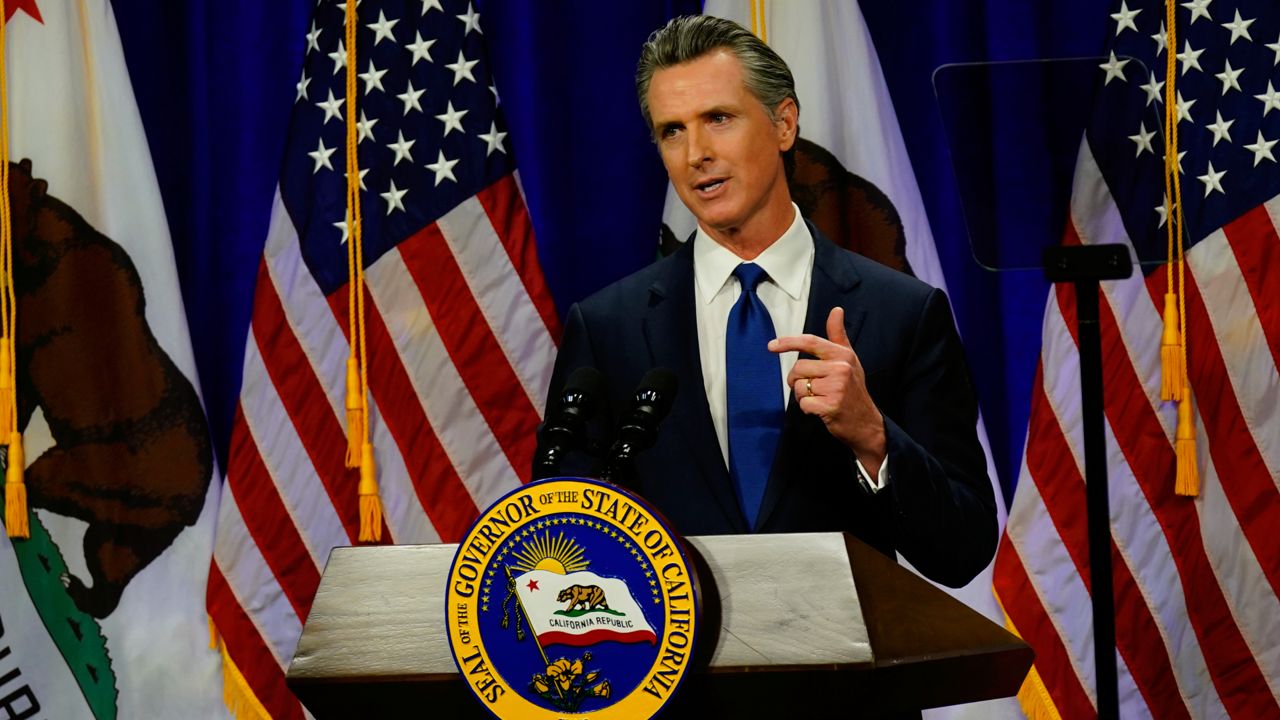PORTLAND, Ore. (AP) — The Democratic governors of California, Washington and Oregon on Friday vowed to protect reproductive rights and help women who travel to the West Coast seeking abortions following the Supreme Court’s decision to overturn Roe v. Wade.
The three states are building a “West Coast offense” to protect patients’ access to reproductive care, California Gov. Gavin Newsom said in a video statement announcing the plans along with Oregon Gov. Kate Brown and Washington Gov. Jay Inslee.
The states issued a joint “multi-state commitment,” saying they will work together to defend patients and medical professionals providing reproductive health care.
They also pledged to "protect against judicial and local law enforcement cooperation with out-of-state investigations, inquiries and arrests” regarding abortions performed in their states.
The liberal West Coast states anticipate an influx of people seeking abortions, especially as neighboring conservative states move to outlaw or greatly restrict the procedure.
“More than half the nation’s population now lacks safe access to a medical procedure that only a patient and their doctor can and should make for themselves,” Inslee said in a statement. “Washington state remains steadfast in our commitment to protecting the ability and right of every patient who comes to our state in need of abortion care."
In California, Democrats who control state government have spent the past year preparing for a post-Roe world. It started in September, when Newsom declared California a "reproductive freedom state” and established a group of abortion rights’ activists to examine California’s abortion laws and figure out how to strengthen them.
The result was a package of 13 bills moving through the Legislature this year. Newsom will likely sign one of them into law Friday, a measure aimed at shielding abortion providers and volunteers from civil judgements imposed by out-of-state courts.
Oregon has codified the right to an abortion. State law was updated in 2017 and allows for late-term abortion and requires private medical insurance and state Medicaid to cover the procedure. A $15 million fund established by state lawmakers this year covers costs for abortion providers and patients without insurance coverage or traveling from out of state.
The fund also seeks to expand abortion access in Oregon’s rural communities.
“No matter who you are or where you come from, Oregon doesn't turn away anyone seeking health care,” Brown said.
Oregon Attorney General Ellen Rosenblum echoed the governor's comments. “Abortion is still legal here in Oregon,” she tweeted. “Our doors are open to every person who may need to walk through them.”
Washington Attorney General Bob Ferguson also said he will work to ensure his state "welcomes any individual who comes here to access the fundamental right to reproductive justice,” adding that he is "already working to protect medical professionals who are prosecuted in other states for providing essential health care services that are legal and protected in Washington.”
Ferguson says he has a team of 20 staffers working on the issue.
Washington and Oregon border Idaho, which following Friday’s ruling will ban abortions except in cases of reported rape or incest, or to protect the mother’s life.
Abortion has been legal in Washington state since a 1970 statewide ballot referendum. Another ballot measure approved by voters in 1991 affirmed a woman’s right to choose physician-performed abortion prior to fetal viability and further expanded and protected access to abortion in the state if Roe v. Wade was overturned.
In California, abortion was outlawed in 1850, except when the life of the mother was in danger. The law changed in 1967 to include abortions in the case of rape, incest or if a woman’s mental health were in danger.
In 1969, the California Supreme Court declared the state’s original abortion law to be unconstitutional but left the 1967 law in place. In 1972 — one year before the Roe v. Wade decision at the U.S. Supreme Court — California voters added a “right to privacy” to the state constitution. Since then, the state Supreme Court has interpreted that right to privacy as a right to access abortion.
Local governments in the states said they were also ready to help protect and provide abortion access. Washington state’s most populous county will devote $1 million in emergency funding to help women traveling to the Seattle area seeking abortions following the overturning of Roe v. Wade.
King County Executive Dow Constantine said Friday $500,000 will be allocated toward the Northwest Abortion Access Fund. Another $500,000 will go to Public Health – Seattle & King County, which Constantine said will help support the health care system.
Planned Parenthood Advocates of Oregon, Pro-Choice Oregon, the ACLU of Oregon, and Forward Together Action called the Supreme Court decision “oppressive, dangerous and undemocratic” in a joint statement.
“While the right to an abortion is safeguarded in state statute, Oregonians will still be directly harmed by the end of Roe vs. Wade," the groups said, citing a study by the pro-abortion rights Guttmacher Institute estimating Oregon health centers could see a huge increase in patients coming from states where abortion will be banned or severely restricted.



